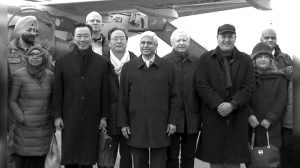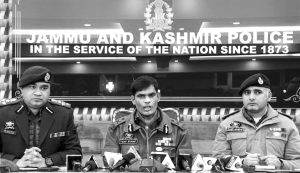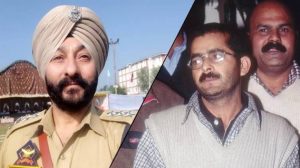An i-10 car intercepted by a bunch of tipped-off cops in Kulgam’s Mir bazaar threw up a major surprise for all and sundry on January 11. A star-studded officer referred by many as a ‘blue-eyed boy’ was caught chaperoning his nemesis out of the snowbound valley. Suspended and subsequently stripped of his gallantry medal, the JKP officer’s arrest has renewed the probe demands of 2001 Parliament and 2019 Pulwama attacks.
By Haneef Pandit
A battery of gritty investigators who took turns to interrogate both a high-profile insurgent and his ‘highway hauler’—a rank counterinsurgent of yore—assert that it was another “sabbatical” for a former constable turned insurgent commander, until a turbaned officer’s ‘wild run’ was cut short by his own department.
A phone call that Naveed Babu made to his brother sealed the fate of his secretive seasonal sojourn.
The call trackers in a cop cell swiftly alerted the police rank and file—particularly SP Shopian, besides oiling the ‘frozen’ counterinsurgent grid for the possible clash.
But before going for a manhunt, a high-ranking police officer rang up IGP Kashmir’s Srinagar office. A day later, in a presser, Vijay Kumar would tell the curious press corps of Srinagar that he was himself supervising the operation, which shortly startled him—like others, and created a new political din amid the controversial citizenship and campus commotion.
Soon, as a dragnet was laid down, an officer recently seen smiling for shutterbugs with a group of envoys at Srinagar airport was caught in a trap—along with two militants, and an advocate registered as ‘OGW’ in police records.
The captured cop happens to be someone enjoying a reputation of playing his part in ‘thwarting’ the fidayeen attack on Pulwama district lines in 2017. For his bravado, he would later earn a state gallantry medal.

But the dramatic development at Mir Bazaar took its own time to become news in an internet-blocked valley.
The first whiff came later that day, when a New Delhi-based TV channel apparently broke the news. It was almost midnight and not many could sniff the sensational seize down south.
Next day, as other three militants, including their commander Hamaad Khan were killed in a gunfight at Tral, the IGP Kashmir made an official statement on the Mir Bazaar operation. “Yesterday, we arrested a top militant, his aide, an OGW, and a police officer by intercepting their car in Kulgam,” Kashmir police chief confirmed.
The arrested officer, IGP Vijay Kumar added, was being investigated at par with the captured militants “for his heinous crime”.
By then, police was done raiding his residence—wherefrom they had recovered a stack of firepower, including AK-47.
But amid investigation, the question everyone was asking—was: what was the officer doing with a top insurgent?
Alleged for expediting a conspicuous clandestine trip to New Delhi two decades ago, many wondered, keeping the upcoming January 26 in view, was the officer upto something big?
The air of speculation further deepened when Davinder Singh’s current posting with anti-hijacking squad at Srinagar airport came calling in mind. Amid US-Iran showdown that saw Tehran ‘mistakenly’ downing Ukrainian plane in a heat of the moment, hijacking under the nose of the apprehended officer looked a bit farfetched, but not implausible, given how Kashmir has its own history of air break-ins.
Much of the details and clarity, however, came in an interrogation centre—set up, reportedly, somewhere in south Kashmir.
For most of the time, Singh, aware of interrogation tactics and techniques, reportedly tried to persuade his interrogators that he was on a duty—‘ferrying militants for surrender’.
But when his answers failed to impress a motley group of sleuths—comprised of “Military Intelligence, CID, RAW and NIA”, he finally disclosed the Rs 12 lakh-deal to escort the 20-lakh bounty militant and his aide to Chandigarh, where he was supposed to arrange accommodation for them for a couple of months.
What surprised many was the Singh’s another disclosure: It wasn’t the first trip he was arranging for Naveed Babu.
Last year, Singh told his interrogators, he had arranged a similar “sabbatical” for the militant commander in Jammu and later his homecoming to Shopian. With Kashmir Valley’s upper reaches—known to act as ‘out of bound hideout’ for militants—currently draped with snow, the interrogators have learned that the recent cut short visit was meant for “rest and recuperation”.
However, with investigation on, more skeletons are likely to tumble out of the Singh’s secretive closet.
But if the entire case is indeed about money, as many tend to believe, then Singh is not the instance of his only kind.
His case reminds one of a customs officer in the erstwhile Bombay who was caught for shipping incriminating substance in lieu of money. Later, his act saw the film city losing its calm to 1993 blasts. Another example comes from Pathankote, where a police officer was reportedly ‘honey-trapped’ for the attack on a military installation, creating new tensions in Indo-Pak relations.

But most likely, it’s said, it may prove to be a case of a cop gone wrong — or what many Delhi-based commentators are calling it: ‘a cop gone rogue’.
“At the end of the day, he may be just a face,” a TV anchor said while debating Singh’s case lately. “But about his bosses? And why police took three decades to unmask him?”
However, no sooner did Singh trend for all the wrong reasons, his parent organization sent out a series of tweets reminding everyone, especially the noisy netizens of JKP’s “sacrifice and professionalism”, and that “it doesn’t even spare the wrongdoers in its ranks”.
Even the former JKP officers termed the erring cop just a ‘bad element’ in its rank, “which has been identified and taken to task by his own department”.
JKP has also constituted SIT—Special Investigation Team—for probing the officer’s links with Hizbul Mujahideen, the pro-Pakistan militant outfit, whose second-in-command and aide were arrested with Singh.
Amid the raging controversy over Singh’s links with militants, former task force chief, Farooq Khan, now LG Murmu’s advisor termed the captive officer a ‘black sheep’. But the opposition Congress, led by the two vocal Gandhi siblings saw a major window of political opportunism—calling Singh just a face and demanding a new probe in Pulwama highway bombing that killed 40 odd paramilitary forces in February 2019.
Singh was reportedly posted in Pulwama during the suicide bombing—that rattled the Indian subcontinent, mounted hate-attacks on Kashmiris outside the valley, and threatened a fresh Indo-Pak faceoff on frontiers.
During his considerable posting in south Kashmir after 2016, Singh might not have been following his own free script, but his drive with militants, on close heels of January 26 makes many speculative about his real intentions.
The ruling BJP, however, remains dismissive about a new war cry of ‘probe Pulwama again’ and is equating the demand with a clean chit to Pakistan—who had called the suicide bombing as a ‘false flag’. But many, like AAP’s Prashant Bhushan, calls Singh’s sudden arrest as the ruling party’s ‘classic diversionary politics’.
Politics over the big catch might further escalate in coming days, but amid the brouhaha, Singh’s chequered cop career has already become the talk of town.

Before coming of age, Singh, who hails from south Kashmir’s Tral, almost saw himself getting fired from the police department during 1990s. His felonry of cashing in on the seized narcotic contraband sent him on a punishment posting in dreaded Special Operations Group. His fleeting stint as operations guy ended with his posting in police lines, wherefrom he was eventually sent back to SOG.
During his second stint with SOG, it’s said Singh bumped into a former JKLF militant, who eventually accused him of a custodial torture.
Much of the details about it surfaced from one of the smuggled letters of the Parliament attack convict, Afzal Guru, from Delhi’s Tihar Jail. Guru was hanged in the same jail on February 9, 2013—almost in a hush-hush manner. His family is still demanding his mortal remains buried in Tihar.
When Guru’s letter came out, its contents were widely-reported. There was a name—“D.S.P. Dravinder Singh”—in it. The letter claimed that ‘Dravinder’, actually Davinder Singh coerced Guru to visit New Delhi and arrange logistics for one of the Parliament attackers named Mohammad.
But in a polarized atmosphere full of war frenzy, Singh’s name was never considered for the follow-up action. JK’s top cop Dilbag Singh has, however, now given his nod to probe the arrested officer’s past, besides recommending his name for service termination.
Already, many military and intelligence veterans debating his case see Singh as part of some ‘big game’. They even dub him a “double agent” and “an enemy within”. But with NIA taking the front in the case with MHA’s approval, many more revelations are likely to come out.
Till then, amid a media storm, a padlock dangling on one of Singh’s residences will continue to make him the most hunted news of the recent times.

















